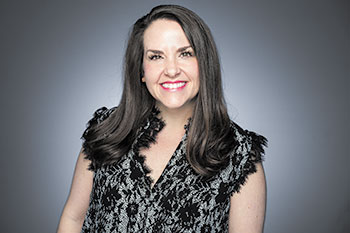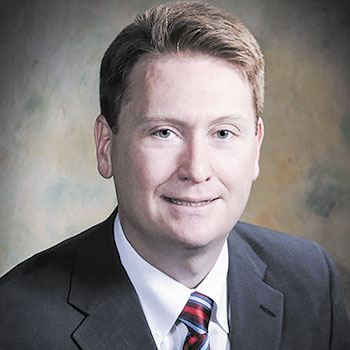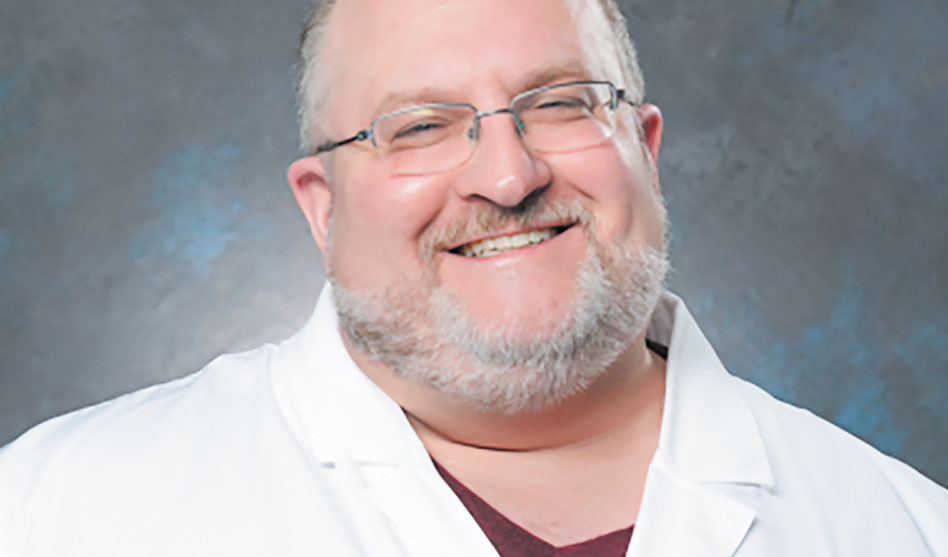PHNTX Director of Clinical Research Dr. Gary Sinclair
Developing new forms of PrEP is key to ending AIDS, medical professionals say
CAROLINE SAVOIE | Contributing Writer
CaroSavoWrites@gmail.com
Much has changed in the world of HIV pre-exposure prophylaxis (PrEP) in the four years since COVID-19 shut down the world — from delivery methods to length of time between treatments. In 2024, there are more PrEP products available than ever before, giving hope to researchers and providers chasing the goal of ending the U.S.’s HIV epidemic by 2030.
According to the CDC, an estimated 40 million people are living with HIV worldwide, with 1.2 million of those people living in the U.S. About 10 million of the people living with HIV do not have access to treatment.

NTIDC Physician’s Assistant Erin Duhaime
The Texas Department of Health and Human Services reported that in 2022, 40,000 Texans were on PrEP. Dr. Doug Hardy, lead provider at Prism Health North Texas’ South Dallas clinic, said 93 percent of those people are male, 53 percent are white, 32 percent are Hispanic, and 11 percent are African-American.
“Most people who could benefit from PrEP are Black/African-American or Hispanic/Latino,” according to the CDC, “but CDC data suggest relatively few Black or Hispanic/Latino people have been prescribed it,.
“Among people who are eligible to receive PrEP, 78 percent of white people already had begun taking this medication by 2021. By comparison, only 11 percent of Black people who are eligible to take PrEP had started.”
Rates of PrEP prescriptions are trending positively, according to the CDC, with about 30 percent of people who could benefit from PrEP being prescribed it in 2021, compared to only about 13 percent in 2017.
But despite this positive trend, the CDC notes, HIV prevention efforts must have farther reach faster for progress to reach all populations equitably and achieve a national goal for half of all eligible people to be on PrEP by 2025.
A recent CDC study found that four in 10 transgender women in seven major U.S. cities have HIV.
“Many social and economic factors — including transphobia, stigma, experiencing homelessness or unemployment and others — have made it more difficult for transgender women to access services and have put them at greatly increased chances of getting HIV,” the CDC says.
A Texas judge’s 2022 ruling that employers are not required to cover PrEP medications if it violates their religious beliefs was a setback for efforts to end the epidemic within the decade. But in 2023, HIV prevention strategies expanded, backed by a panel of experts on the U.S. Preventive Services Task Force, which now requires private insurance companies to cover these drugs without a copay or deductible under the Affordable Care Act.
But the task force’s recommendation does not make access easier for uninsured people.
Hardy worked in an HIV clinic in the 1990s where he saw both adults and children infected with HIV. At that time, he said, abstinence and condoms were the only way to prevent the disease that was then still essentially a death sentence.

PHNTX’s Dr. Doug Hardy
He said the first PrEP product, an oral once-daily pill called Truvada, was approved by the U.S. Federal Drug Administration in 2012. There has been a global increase in PrEP use since then, with other pills — like Descovy — coming on the market. And having multiple forms of medication accessible to patients at risk of HIV offers major benefits, he added.
“Multiple delivery systems give us a way to tailor medications to a person’s needs,” Hardy said. “It also lowers the cost of medication. Some people have difficulties taking oral pills, so having injections gives a whole other route. If you have an allergy to the oral medication, you have another option.”
He said there are other reasons people might not be able to take the two types of pills available to prevent HIV: “Descovy had different side effects as far as bones and kidneys go,” he said. “When people use Truvada for decades, it can lead to osteoporosis and kidney problems. And Descovy isn’t for people with congenital vaginas, so if you were born with a vagina, it’s not for you. And it doesn’t work as well for IV drug users.”
Hardy said this gap in the market led researchers to develop other medications that make PrEP more accessible. In addition to oral PrEP, the World Health Organization now recommends a shot and a vaginal ring to prevent HIV.
Dr. Robin Schaefer, a PrEP researcher for the Forum for Collaborative Research at University of California — Berkeley, said COVID-19’s lockdowns forced researchers to find new ways of delivering the medication.
Since COVID-19 hit in March 2020, Apretude, an injectable given every two months, has hit the market.
“Lots of people have trouble taking a pill every day,” Hardy said. “They can also feel insecure about having a pill bottle on them. Apretude is a route for people to get an injection every two months, which is more convenient.”
And in December 2021, the task force approved cabotegravir, a long-acting shot, as a PrEP treatment.
Cabotegravir is administered every two months and offers an alternative to people who are unable to take a daily pill. In two trials, the shot was more effective at preventing HIV than Truvada was.
In 2023, dapivirine, a silicone ring that is inserted in the vagina every month and delivers long-acting, topical and localized HIV prevention, also became available.
“When I talk to people, there’s not one drug of choice, there are just trade-offs with each drug,” Hardy said.
Erin Duhaime, a physician’s assistant at North Texas Infectious Disease Consultants, said the country’s attention is on PrEP right now, and more avenues to prevention are being researched than ever before. She referenced the vaginal ring and medical implants as two new options being studied.
“It doesn’t matter if it’s bubblegum that prevents HIV, as long as it’s preventing infections, it’s helping us reach our goals,” Duhaime said.
Hardy said as a population, there are still problems with increasing HIV transmission. He said over the past several years, there have been 4,500 new cases of HIV in Texas each year, and in 2022, there were 4,900 new cases.
“It goes up and down, but there’s a lot of people having unprotected sex without PrEP,” Hardy said. “I see a lot of people for STI care who don’t think they’re going to get [HIV], so they’re not on PrEP, and eventually they become positive. Those are cases that could have been avoided.”
He said people don’t always appreciate how at risk they are. In Texas in 2021, one out of eight men who have sex with men had HIV.
“If people are having sex with people in that population, they’re at major risk. Education about who is at risk is important,” Hardy said.
He said that receptive anal intercourse poses the biggest risk for getting HIV, with a 1-in-72 chance of testing positive. He said those participating in insertive anal intercourse have a 1-in-900 chance of testing positive. For receptive vaginal intercourse, there’s a 1-in-1,250 chance of testing positive for HIV, and for insertive vaginal intercourse, there’s a 1-in-2,500 chance of getting HIV.
Those sharing needles have a 1-in-150 chance of contracting the virus, and healthcare providers with needle stick injuries have a 1-in-435 chance of contracting it.
Duhaime said she works with cisgender women who didn’t previously understand their risk of HIV. She said that providers should be more comfortable bringing sex talk into the doctor’s office to increase prevention.
“Most providers don’t ask cis women what kind of sex they’re having, where they’re putting what,” she said. “We’re all adults. We need to talk to our providers about our sex lives, which will contribute not only to Dallas’ initiative but the national and global initiatives.”
Dr. Gary Sinclair, director of clinical research at PHNTX, has worked on more than 50 clinical trials including several PrEP trials. He said there are studies happening now for once-a-month pills and for every-six-month injections. At PHNTX, Sinclair is enrolling participants in one PrEP trial, Merck 007, to test a once-a-month PrEP pill.
Pointing to the fact that there were 36,000 new HIV infections in the U.S. in 2021, Sinclair said, “That is way too many people becoming infected with HIV. Clearly, neither Truvada or Descovy has eradicated or solved the problem, so we need to look to new avenues.”
He said those new avenues, like the injection Apretude or vaginal PrEP rings, aren’t just nice to have; they’re life-saving measures.
Merck 007 is a placebo controlled phase one A trial. Sinclair said while some people question the ethics of performing a placebo controlled trial for HIV prevention, the study fits the criteria to safely perform the study.
“Because it’s an early study, we’re not enrolling people who need PrEP, we’re enrolling people at very low risk of contracting HIV,” he said. “It’s a healthy volunteer study, meaning only people with low to no risk of infection are signing up — people doing this out of altruism.”
Sinclair said this could look like people in a monogamous relationship with a partner who is HIV negative, people who use condoms 100 percent of the time, people who haven’t had a bacterial STI in the last six months, people who aren’t part of a disproportionately affected group and people who don’t live in a place with a high HIV infection.
“In three trials, including the one I’m working on now, we haven’t seen a single HIV infection in any of them,” he said. “We’re working with a very low risk population.”
Sinclair said the main goal of this trial is to ensure there aren’t any unusual side effects. If the drug appears to be safe, it will move on to phase two and three trials.
He said having a once-a-month pill is important because while Truvada and Descovy have worked well in reducing infections in men and transgender women, they don’t do the job well in cisgender women for several reasons. He said even if women know they need PrEP, it’s difficult to get them to take it every day because they don’t want to carry the pill bottle for one reason or another.
“Some people are ignorant, and they’ll think that a person has HIV if they’re on PrEP,” Sinclair said. “If a person is married and on PrEP, someone might think they’re having sex outside of their marriage. Or [women] could be victims of domestic abuse and be harmed if they were caught on PrEP.”
He said once daily pills haven’t done the job that needs to be done, as many cisgender women have difficulties adhering to the regiment. He said across the gender spectrum, long-acting PrEP methods are easier to keep up with.
Sinclair said in one study of South African women taking once daily PrEP, 85 percent of the women took at least four pills each week. “Their rate of HIV infection was the same as if they took nothing,” Sinclair said. “So having options outside of a once daily pill isn’t just nice to have, it’s a critical, life-saving measure. Long-acting options are a part of that solution.”
He said Dallas is a hub for PrEP research, which is a double-edged honor. “We have the highest number of patients enrolled in trials, which is nice because we’re getting trials done, but it also makes me sad because there are lots of new infections,” Sinclair said. “It’s a dubious honor.”
Sinclair said it’s important to remember that HIV treatment also works as prevention since an undetectable viral load is an untransmittable one.
“If the house is on fire, you don’t decide which neighbor’s hose you’re going to use,” Sinclair said. “You want to throw everything you can at the problem, and that’s what we’re working on now — building as many hoses as possible to put out this fire.”

